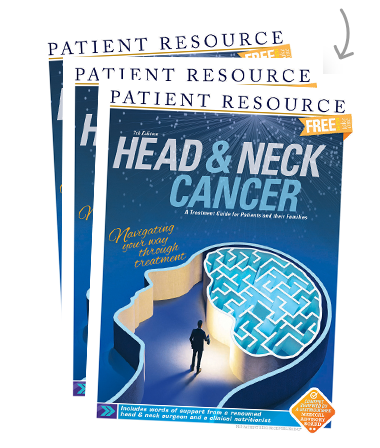Head and Neck Cancer
For the Caregiver
Being a caregiver for someone with a head and neck cancer is challenging. Flexibility, patience and compassion will be key. Having a plan may help you understand how to best help. Start with these suggestions and remember that your loved one’s needs will change.
Learn about this diagnosis. Using reputable resources such as this guide and those recommended by the health care team, learn about your loved one’s head and neck cancer diagnosis, treatment and rehabilitation options, and the common challenges ahead.
Get permission to receive medical information. Be sure you are authorized to communicate with your loved one’s health care team, renew prescriptions and more. Introduce yourself to the key contacts and ask about their preferred contact method, such as by phone, text or through the portal.
Act as communications central. Treatment may affect your loved one’s ability to speak. Before treatment begins, determine how you will communicate with each other, such as writing notes or texting. Then, create an email group so you can update friends and family throughout treatment. This will dramatically reduce phone calls and individual emails as well as ensure that everyone gets the same information.
Manage a healthy diet. Maintaining proper nutrition is critical. Your dietitian can teach you to help with tube feeding (if applicable) and offer suggestions for the different types of food that can be eaten once your loved one resumes eating by mouth. Don’t neglect your own dietary needs. You need to stay strong and healthy.
Watch for side effects. Before treatment begins, find out which symptoms and side effects require regular or emergency medical attention. Track when side effects occur, how long they last and whether anything makes them better. You can download a free side effect tracker at PatientResource.com/Tracker Share this information with the health care team at regularly scheduled appointments or sooner if your loved one is not getting relief.
Get creative with clothing. Sometimes people with a stoma are more comfortable when it is concealed. Help find comfortable clothing and accessories to cover it.
Find emotional support for both of you. Depression is common for head and neck cancer patients and caregivers. It may be helpful to include an onco-psychologist on your team. Learning from patients and caregivers whose lives are affected by head and neck cancer can be extremely valuable. Local and national advocacy groups offer help online, by phone and in person.
Explore assistance resources. Financial and patient assistant resources, such as HNC Living Foundation (hncliving.org) and KEY+YOU (keyplusyou.com), may be able to help (see Resources).



